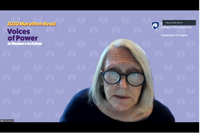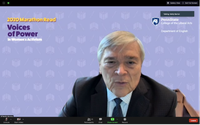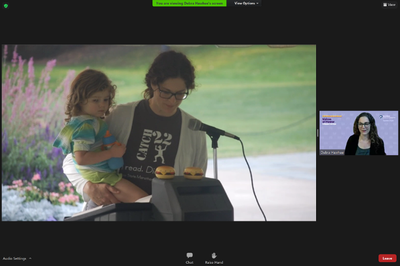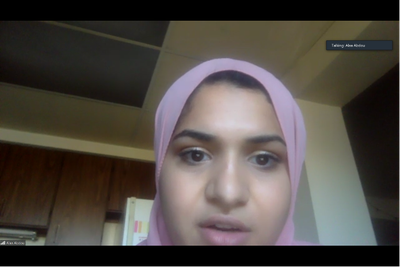Penn State Captures 100 years of Activism in 12-hour Zoom Read-a-Thon

On November 7, 2020, Kamala Harris addressed the nation as the first female Vice President-elect in United States history. Her speech spoke directly to the women of 2020, heralding “a new generation of women [...]who cast their ballots and continued the fight for their fundamental right to vote.”
Harris acknowledged that it was the long line of hardworking and dedicated women of the past who made the mobilization of female voters in this election not only a reality, but also a possibility. Recognizing that those who fought for the Nineteenth Amendment (1920) and Voting Rights Act (1955) did so only one hundred fifty-five short years ago, Harris applauded her mother and the generations of women, specifically women of color, “who fought and sacrificed so much for equality, liberty and justice for all [...] who are too often overlooked, but so often prove that they are the backbone of our democracy.”

- President Eric Barron and First Lady Molly Barron read from Kate Chopin’s “The Awakening”.
 Just over two weeks before Harris’s monumental speech, Penn State also honored exceptional female activists with this year’s Marathon Read. Held annually, the Marathon Read is a twelve hour read-a-thon hosted by Penn State and co-sponsored by CALS. Celebrating the centennial anniversary of the Nineteenth Amendment, the 2020 Marathon Read theme, “Voices of Power in Women’s Activism,” complemented the College of the Liberal Arts’ theme of the year, “Moments of Change: A Century of Women’s Activism”. The event included reading selections from works by many women authors and activists across the nation’s history, including Kate Chopin, Audre Lorde, Ruth Bader Ginsburg, Sojourner Truth, Tillie Olsen, Anna Julia Cooper, Stacey Milbern, Julie Otsuka, Rebecca Solnit, and Joy Harjo. Readings of the Nineteenth and Twenty-Fourth Amendments were also included. The list of participant readers was just as diverse. From students and faculty to alumni and administrators, including President Eric Barron and First Lady Molly Barron, volunteer readers represented a broad cross-section of the Penn State community.
Just over two weeks before Harris’s monumental speech, Penn State also honored exceptional female activists with this year’s Marathon Read. Held annually, the Marathon Read is a twelve hour read-a-thon hosted by Penn State and co-sponsored by CALS. Celebrating the centennial anniversary of the Nineteenth Amendment, the 2020 Marathon Read theme, “Voices of Power in Women’s Activism,” complemented the College of the Liberal Arts’ theme of the year, “Moments of Change: A Century of Women’s Activism”. The event included reading selections from works by many women authors and activists across the nation’s history, including Kate Chopin, Audre Lorde, Ruth Bader Ginsburg, Sojourner Truth, Tillie Olsen, Anna Julia Cooper, Stacey Milbern, Julie Otsuka, Rebecca Solnit, and Joy Harjo. Readings of the Nineteenth and Twenty-Fourth Amendments were also included. The list of participant readers was just as diverse. From students and faculty to alumni and administrators, including President Eric Barron and First Lady Molly Barron, volunteer readers represented a broad cross-section of the Penn State community.
One of this year’s invited readers was Dean of the College of the Liberal Arts, Clarence Lang, who shared that this year’s focus on women’s activism stresses the significance of “civic engagement, democratic participation, and even protest at this critical moment for our nation.” As Lang suggests, appreciating the influential women of history is important work, as well as an opportunity to reflect. Recognizing these women’s political contributions brings to light a history that has not been inclusive or representative of their impact. Claire Bourne, Co-organizer of the Marathon Read and Assistant Professor of English, elaborated on the event’s commitment to showcase, in Harris’s words, voices that are “too often overlooked.” The anniversary was an inspiration “for gathering together fiction, poetry, and non-fiction writings by American women from a variety of backgrounds,” Bourne explains. Across the twelve-hour event, participants enthusiastically read every word of each selected text, while praising the welcoming nature of the event and its mission.

- Kick-off reader Debra Hawhee shares a picture of her and her daughter Nora at the first Marathon Read Event in 2012.
While this year’s Marathon Read and its inspiring message received praise from participants, the complication of COVID-19 posed a number of challenges to the event’s organizers, who had to modify its traditional format. Joe Bueter, Assistant Teaching Professor of English and co-organizer with Bourne of this year’s Marathon Read, spoke about some of those challenges. In previous iterations, passerbys could walk up to the event and listen. However, the 2020 format demanded outreach in a way the organizing team had never experienced before. Navigating host and reader hand-offs, providing detailed instructions for participants (such as how to follow along and access the texts), switching between texts, and prepping listeners with the proper Zoom links were new hurdles for the event and organizers. The team kept the technical aspects as simple as possible to mitigate potential issues. As Bueter surmises, “Fewer moving parts; fewer problems.” This choice contributed to the smoothness of the event that boasted seamless transitions between readers every ten minutes and hosts every hour or so.
Despite these difficulties, however, the virtual setting also provided its own opportunities for inclusion by expanding participation beyond Penn State’s University Park campus. Penn State English alumna Hannah Bracale, who was only able to attend because of the virtual setup, found it a meaningful addition to her day. She was even able to extend the event to her own Philadelphia area network, sharing, “ I was looking forward to the event for some time, and both my roommate and I really appreciated having the live stream up throughout the day!” Bourne hopes that this aspect of reaching beyond State College remains a regular feature of future Marathon Reads, even when it returns to an in-person format. Despite the steep learning curve associated with hosting the event amid the pandemic, the virtual format produced one of the most inclusive reads yet.

- Alaa Abdou reads Kate Chopin’s “The Awakening”.

On November 7, 2020, Kamala Harris addressed the nation as the first female Vice President-elect in United States history. Her speech spoke directly to the women of 2020, heralding “a new generation of women [...]who cast their ballots and continued the fight for their fundamental right to vote.”
Harris acknowledged that it was the long line of hardworking and dedicated women of the past who made the mobilization of female voters in this election not only a reality, but also a possibility. Recognizing that those who fought for the Nineteenth Amendment (1920) and Voting Rights Act (1955) did so only one hundred fifty-five short years ago, Harris applauded her mother and the generations of women, specifically women of color, “who fought and sacrificed so much for equality, liberty and justice for all [...] who are too often overlooked, but so often prove that they are the backbone of our democracy.”

- President Eric Barron and First Lady Molly Barron read from Kate Chopin’s “The Awakening”.
 Just over two weeks before Harris’s monumental speech, Penn State also honored exceptional female activists with this year’s Marathon Read. Held annually, the Marathon Read is a twelve hour read-a-thon hosted by Penn State and co-sponsored by CALS. Celebrating the centennial anniversary of the Nineteenth Amendment, the 2020 Marathon Read theme, “Voices of Power in Women’s Activism,” complemented the College of the Liberal Arts’ theme of the year, “Moments of Change: A Century of Women’s Activism”. The event included reading selections from works by many women authors and activists across the nation’s history, including Kate Chopin, Audre Lorde, Ruth Bader Ginsburg, Sojourner Truth, Tillie Olsen, Anna Julia Cooper, Stacey Milbern, Julie Otsuka, Rebecca Solnit, and Joy Harjo. Readings of the Nineteenth and Twenty-Fourth Amendments were also included. The list of participant readers was just as diverse. From students and faculty to alumni and administrators, including President Eric Barron and First Lady Molly Barron, volunteer readers represented a broad cross-section of the Penn State community.
Just over two weeks before Harris’s monumental speech, Penn State also honored exceptional female activists with this year’s Marathon Read. Held annually, the Marathon Read is a twelve hour read-a-thon hosted by Penn State and co-sponsored by CALS. Celebrating the centennial anniversary of the Nineteenth Amendment, the 2020 Marathon Read theme, “Voices of Power in Women’s Activism,” complemented the College of the Liberal Arts’ theme of the year, “Moments of Change: A Century of Women’s Activism”. The event included reading selections from works by many women authors and activists across the nation’s history, including Kate Chopin, Audre Lorde, Ruth Bader Ginsburg, Sojourner Truth, Tillie Olsen, Anna Julia Cooper, Stacey Milbern, Julie Otsuka, Rebecca Solnit, and Joy Harjo. Readings of the Nineteenth and Twenty-Fourth Amendments were also included. The list of participant readers was just as diverse. From students and faculty to alumni and administrators, including President Eric Barron and First Lady Molly Barron, volunteer readers represented a broad cross-section of the Penn State community.
One of this year’s invited readers was Dean of the College of the Liberal Arts, Clarence Lang, who shared that this year’s focus on women’s activism stresses the significance of “civic engagement, democratic participation, and even protest at this critical moment for our nation.” As Lang suggests, appreciating the influential women of history is important work, as well as an opportunity to reflect. Recognizing these women’s political contributions brings to light a history that has not been inclusive or representative of their impact. Claire Bourne, Co-organizer of the Marathon Read and Assistant Professor of English, elaborated on the event’s commitment to showcase, in Harris’s words, voices that are “too often overlooked.” The anniversary was an inspiration “for gathering together fiction, poetry, and non-fiction writings by American women from a variety of backgrounds,” Bourne explains. Across the twelve-hour event, participants enthusiastically read every word of each selected text, while praising the welcoming nature of the event and its mission.

- Kick-off reader Debra Hawhee shares a picture of her and her daughter Nora at the first Marathon Read Event in 2012.
While this year’s Marathon Read and its inspiring message received praise from participants, the complication of COVID-19 posed a number of challenges to the event’s organizers, who had to modify its traditional format. Joe Bueter, Assistant Teaching Professor of English and co-organizer with Bourne of this year’s Marathon Read, spoke about some of those challenges. In previous iterations, passerbys could walk up to the event and listen. However, the 2020 format demanded outreach in a way the organizing team had never experienced before. Navigating host and reader hand-offs, providing detailed instructions for participants (such as how to follow along and access the texts), switching between texts, and prepping listeners with the proper Zoom links were new hurdles for the event and organizers. The team kept the technical aspects as simple as possible to mitigate potential issues. As Bueter surmises, “Fewer moving parts; fewer problems.” This choice contributed to the smoothness of the event that boasted seamless transitions between readers every ten minutes and hosts every hour or so.
Despite these difficulties, however, the virtual setting also provided its own opportunities for inclusion by expanding participation beyond Penn State’s University Park campus. Penn State English alumna Hannah Bracale, who was only able to attend because of the virtual setup, found it a meaningful addition to her day. She was even able to extend the event to her own Philadelphia area network, sharing, “ I was looking forward to the event for some time, and both my roommate and I really appreciated having the live stream up throughout the day!” Bourne hopes that this aspect of reaching beyond State College remains a regular feature of future Marathon Reads, even when it returns to an in-person format. Despite the steep learning curve associated with hosting the event amid the pandemic, the virtual format produced one of the most inclusive reads yet.

- Alaa Abdou reads Kate Chopin’s “The Awakening”.